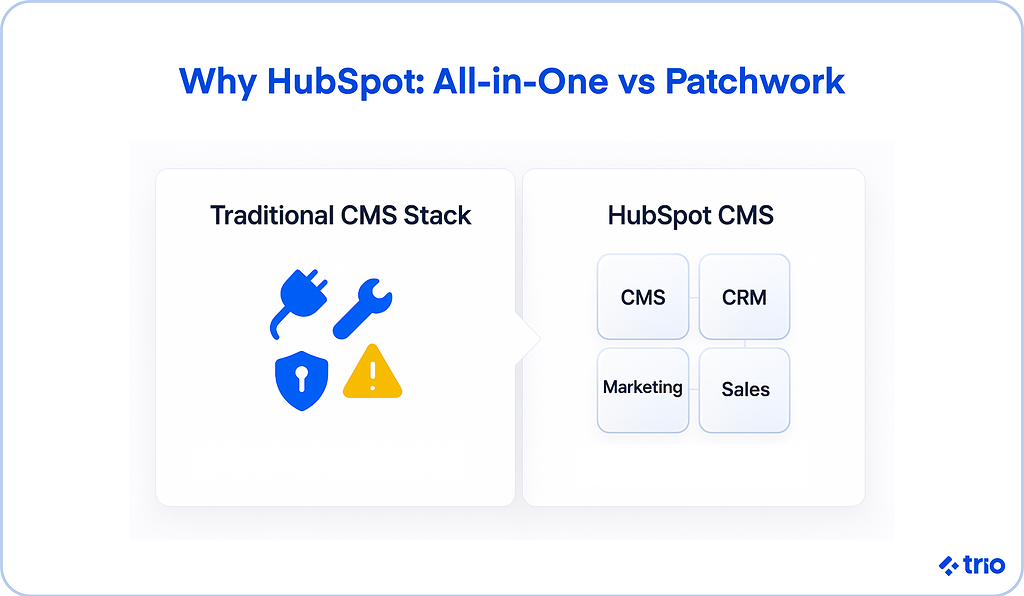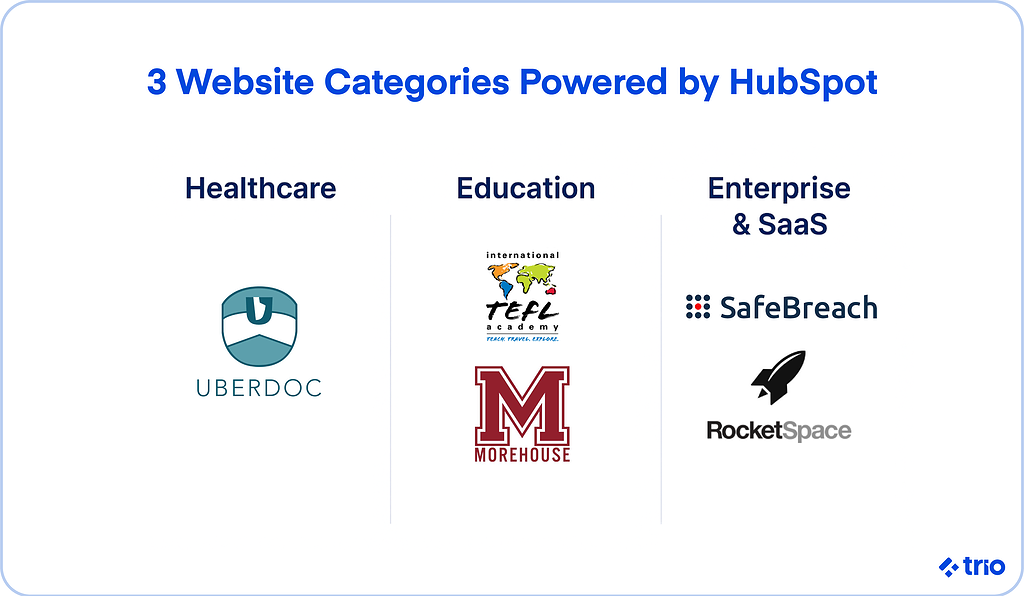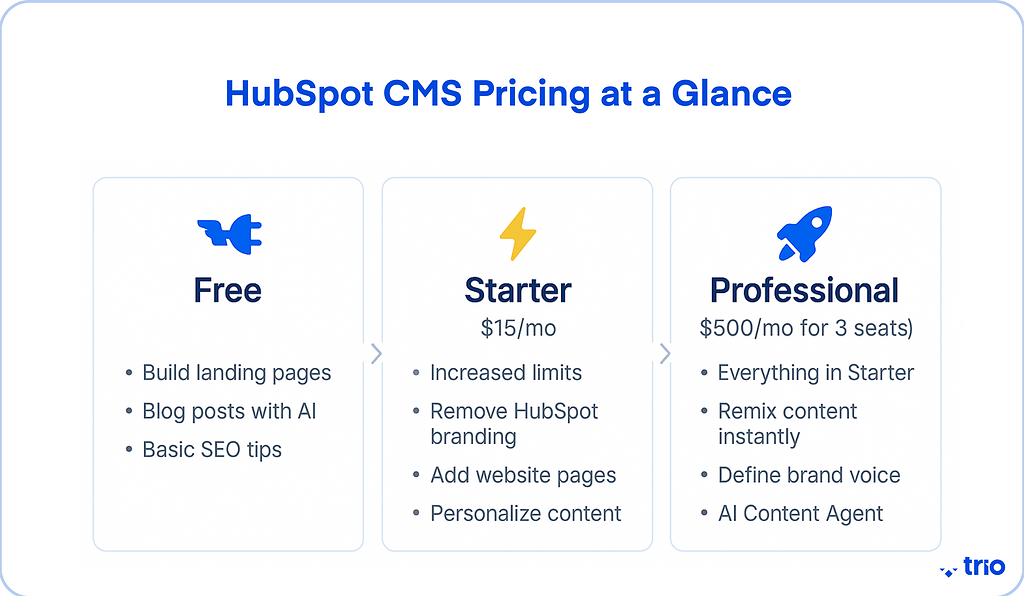Although HubSpot is relatively young compared to other CMS solutions, such as WordPress and Drupal, it’s definitely worth exploring. In less than three years, from 2007 to 2010, HubSpot grew into a multi-million dollar company, with revenues reaching $15.6 million.
Now, roughly a decade later, more than 100,000 websites are built with HubSpot. It has become a rapidly growing CMS solution that is ideal for businesses seeking to scale efficiently and deliver a personalized user experience.
Here, you’ll learn about six HubSpot website examples:
- UBERDOC
- International TEFL Academy
- RocketSpace
- Qt
- SafeBreach
- Stellar Recruitment
Competitors remain in the mainstream and often occupy the majority of the market. But, while many businesses still rely on other CMS solutions, nearly every objective comparison will maintain that HubSpot is the solution to any business’s blogging/content needs.
This is mainly because HubSpot’s integration capabilities with CRM, marketing, and sales tools make it a powerful option. This is even more true when you pair it with our HubSpot development services here at Trio.
Our outsourcing and staff augmentation hiring models enable you to access some of the world’s top HubSpot developers on your team in the most cost-effective way possible.
Still not convinced? Take a closer look at some HubSpot website examples and learn more about how HubSpot can help you.

Are you ready to start your development project?
We have the developers you need to take your development project in the right direction.
Companies are proven to grow their business faster with Trio.
What Is HubSpot CMS?
HubSpot CMS is yet another content management system (CMS) comparable to popular platforms like WordPress or Joomla, but with some notable differences in feature sets.
It is relatively robust and enables seamless integration with CRM and marketing tools. For example, with HubSpot, you can personalize content directly and target consumers. This extends to call-to-actions (CTAs), forms, and even emails.
Trio’s developers can help you further customize websites with advanced features. These can include personalized content, built-in search engine optimization (SEO) recommendations, and A/B testing, allowing you to stage multiple variations of your website live.
With qualified developers, like those at Trio, you can create custom themes (or choose from the many premade themes available) as well as build apps to increase the functionality of your website.
Another favorite among HubSpot customers is the drag-and-drop tool, a component of HubSpot CMS’s design manager that makes putting together a website all the more simple.
These are only a few examples of what HubSpot can do for you. One of the best advantages you’ll get at HubSpot is not its CMS, however.
In addition to the CMS, HubSpot offers a free customer relationship management (CRM) tool. Many of its features are designed to boost your marketing capacity and can be easily integrated into your CMS.
This package deal includes a marketing, sales, and service hub. You can map out the buyer’s journey for your buyer personas and create a rewarding experience for them through your website.
In short, HubSpot is an incredible tool, but it is essential to have qualified developers to unlock its full potential. At Trio, our highly experienced developers possess expertise in utilizing HubSpot to create custom themes and applications. They can also help you with integrations for HubSpot CMS.
Why Build a Website with HubSpot CMS?
You’ll see many similar technologies to HubSpot, and it’s essential to be critical in assessing what does and does not belong in your tech stack. For instance, the main advantages of HubSpot relate to its versatility, which eliminates the need for additional bulk.
It stands out by providing built-in tools for SEO, social media publishing, and personalization. All of this helps you streamline digital marketing tasks almost immediately.
Other CMS platforms like WordPress, which objectively dominate the market – WordPress itself taking up 39% of the web – have tons of features, but there always seems to be a catch.
For instance, features of HubSpot related to SEO and combined publishing on social media are readily equipped as soon as you start using the platform. To compare, WordPress requires that you download additional plugins. This can lead to issues with compatibility or even performance.
Other alternatives to WordPress and HubSpot, such as Drupal or Joomla, may not always be as easy to set up and can pose a challenge for those who prefer the ease of setting up a website in a matter of minutes.
If you need a custom solution, Trio’s developers can give you a further advantage. Our highly experienced, thoroughly vetted developers can help you avoid common pitfalls – like those associated with third-party plugins – and help you create exactly what you need within HubSpot.
They can also help you with long-term maintenance and future growth, ensuring that any additions you make in the future are efficient and that your website remains scalable.
What’s more, in the few times when you’ll find HubSpot doesn’t have what you need, you can integrate HubSpot apps into your website. And with the help of a few trusty developers, you can make an app yourself.
With Trio’s technical expertise, you can easily leverage these integrations and enhance your site’s capabilities to make the most of HubSpot.
14 HubSpot Website Examples

To get a better grasp on how exactly you can use the HubSpot CMS to your advantage, you’ll probably benefit from some live examples.
Each of these examples – UBERDOC, International TEFL Academy, RocketSpace, Qt, SafeBreach, and Stellar Recruitment – also took advantage of Trio’s development services to create their custom solution with optimized user experiences and integrated tools.
1. UBERDOC
UBERDOC is a healthcare platform that prioritizes patient choice. They believe this strengthens the core of a doctor-patient relationship. The website and app also simplify the process by which patients make appointments and see specialists.
Trio HubSpot developers helped UBERDOC integrate their web application with HubSpot CRM in order to efficiently manage non-identifiable user data in their system in a two-way manner.
This enabled them to use HubSpot to prospect leads, chat with them, send marketing emails, and automatically synchronize the app with their website.
2. SafeBreach
SafeBreach enables you to simulate real-world attacks that pose a threat to your environment. The goal is to identify and mitigate risks. And companies as big as Netflix have appreciated the opportunity.
Several features of SafeBreach’s website attract and allure customers. For one, the home page greets you with moving text and images. Several contextual CTAs juxtapose these.
Pete Emerson, the Senior Web Designer for SafeBreach, asserts that “good design, user experience, and solid brand development are essential parts of the conversion funnel.”
Overall, our design and development expertise contributed to SafeBreach’s interactive and visually engaging website, driving user conversion through its well-structured conversion funnel and optimized CTAs.
3. ClassPass
ClassPass is a global subscription service that connects users with fitness studios, gyms, and wellness experiences. With such a broad and constantly changing catalog, ClassPass needed a CMS that could support rapid content updates, personalized offers, and seamless customer onboarding.
By moving to HubSpot Content Hub (CMS Hub), the company gave its marketing team direct control over content creation and optimization. They no longer had to rely on development resources for day-to-day changes. After migrating, ClassPass reported a 52% increase in lead conversion rate from its website, making it a clear demonstration of how HubSpot CMS can turn a high-traffic consumer platform into a powerful growth engine.
This example demonstrates how HubSpot CMS supports businesses operating at scale, providing the agility to launch new campaigns quickly and the data integration necessary to personalize user experiences.
4. International TEFL Academy
TEFL is the acronym for Teaching English as a Foreign Language. To do so, interested parties must earn a certification. For many, having a TEFL certification is the easiest way to travel abroad and visit new places.
Not only is the International TEFL Academy an excellent institution for English speakers to earn a TEFL certification, but it’s also one of many great HubSpot CMS website examples serving tens of thousands of visitors.
If you visit the website, you’ll notice that it is not simply a blog, but hosts content of all types from an ‘About ITA’ page to several other tabs featuring course information, job resources, and videos.
Trio helped them enhance the website’s content structure and improve the overall user experience. This enabled the platform to handle tens of thousands while providing easy navigation.
5. Morehouse College
Morehouse College, a historically Black men’s liberal arts college in Atlanta, needed to modernize its admissions site. The challenge was consolidating content for prospective students, alumni, and other stakeholders while maintaining the school’s distinctive voice and brand identity.
By migrating its website to HubSpot Content Hub (CMS Hub), Morehouse gained a platform that enabled direct collaboration between its marketing and admissions teams. HubSpot’s tools allowed them to streamline content management, create custom landing pages for admissions campaigns, and protect consistency in tone across the site.
This example demonstrates how educational institutions can utilize HubSpot CMS not only for site management but also to enhance brand messaging while providing a more seamless applicant experience.
6. The Chopping Block
The Chopping Block is a cooking school and retailer in Chicago, known for hands-on classes, kitchenware, and culinary events. Their old website made it difficult to target different customer personas or quickly update offers for classes and promotions.
Working with HubSpot, The Chopping Block launched a new persona-driven website on CMS Hub. The modular design made it easy for the marketing team to create landing pages, update CTAs, and run campaigns tailored to specific audience segments. The result was steady organic growth and stronger engagement from key personas, including home cooks, corporate groups, and culinary enthusiasts.
This case demonstrates how small and mid-sized businesses can utilize HubSpot CMS to modernize their websites and deliver personalized experiences without incurring technical overhead.
7. RocketSpace
RocketSpace is a tech company designed to make other tech companies thrive – specifically startups. The company’s industry of choice is coworking spaces, and through these spaces, companies like Uber and Spotify have scaled tremendously.
On RocketSpace’s website, you’ll be confronted with a choose-your-own-adventure layout. Visitors can have a clear and visual presentation of their options, whether that’s ‘Grow Your Startup’, ‘Fuel Corporate Innovation’, or ‘Accelerate With Purpose’. This example is all thanks to HubSpot CMS, of course.
RocketSpace effectively utilized our custom development services at Trio to create an interactive, user-friendly website that reflects their innovative space, enabling startups to access all the resources they need easily.
8. Qt
Qt is a free and open-source toolkit that offers an alternative approach to software development. It is marketed as a toolkit and maintains that its tools offer ‘everything you need for your entire software development life cycle.’
Creating graphical user interfaces and cross-platform applications is Qt’s specialty. However, such a company must convey its purpose effectively. By switching from WordPress to HubSpot some years ago, this objective was successfully accomplished.
They successfully conducted this switch with the assistance of Trio. We also ensured that their website was optimized in terms of both performance and design, providing a modern and efficient user experience.
Today, Qt continues to utilize the marketing automation features that HubSpot provides, as well as the more contemporary design that is intuitive for website visitors. By using both HubSpot’s marketing and content features, Qt serves as a great example of a HubSpot website.
9. Apptega
Apptega is a cybersecurity and compliance management platform. Like many SaaS companies, its marketing team needed more control over content and campaigns, but its old website required constant developer support. This slowed down go-to-market efforts and made it difficult to quickly showcase new product features.
By migrating to HubSpot CMS Hub, Apptega consolidated its tech stack, aligning website management with HubSpot’s marketing and sales tools. The results were striking: the company doubled its website traffic after the migration, thanks to improved SEO, faster publishing, and tighter integration with lead-generation workflows.
This example demonstrates how HubSpot CMS can directly impact growth for SaaS businesses by enabling marketing teams to operate with agility while still maintaining enterprise-level functionality.
10. Quinyx
Quinyx is a workforce management software provider serving global brands across retail, logistics, and hospitality. Their legacy CMS’s limited scalability made it difficult for marketing to update content at the pace required to support growth.
The company migrated to HubSpot CMS Hub and rebuilt its site with scalability in mind. HubSpot gave Quinyx’s marketing team the ability to create and manage pages independently, run A/B tests, and personalize messaging for different audiences, all while maintaining brand consistency.
The migration demonstrates how HubSpot CMS is well-suited for fast-growing international companies, providing them with the tools to manage large websites without compromising speed or user experience.
11. ReachFive
ReachFive is a customer identity and access management (CIAM) platform serving enterprises across industries. Before migrating, their website was hard-coded, meaning even simple updates required developer involvement. This slowed down marketing campaigns and limited their ability to scale content.
By migrating to HubSpot CMS Hub, ReachFive restored ownership of the website to its marketing team. They could now create new pages, launch campaigns, and adjust messaging without waiting on developers. The shift was significant: ReachFive saw a notable increase in both web traffic and new contacts after the migration, thanks to faster publishing cycles and integrated CRM workflows.
This example demonstrates how HubSpot CMS enables B2B SaaS companies to align marketing and product messaging, thereby reducing friction between teams.
12. Stellar Recruitment
Based in New Zealand and Australia, Stellar Recruitment is a trusted recruitment firm across nine industries, including technology, construction, agriculture, corporate services, and more. Soon, you’ll find out why this HubSpot website example is worth mentioning.
Please note that Stellar Recruitment didn’t initially employ a data-driven marketing strategy to generate leads. But with the help of HubSpot, their lead increased by a whopping 5037%! And that’s accompanied by a 229% increase in web traffic. Check out the case study to learn more.
In short, Trio helped them implement HubSpot CMS, which played a significant role in increasing their traffic and lead generation. This showcases how a development company like Trio can utilize HubSpot to drive business growth through data-driven development.
13. Consafe Logistics
Consafe Logistics is a European provider of warehouse management and logistics solutions. With a B2B customer base spanning multiple industries, their old CMS made it challenging to update site architecture or deliver a polished mobile experience.
By launching a new website built on HubSpot CMS, Consafe Logistics streamlined site management and gave marketing direct control of updates. The results were measurable: a 36% increase in customers converted via the website, improved site performance, and smoother mobile navigation.
For Consafe Logistics, HubSpot CMS provided more than just design flexibility. It became a platform where marketing and sales efforts were tightly integrated, helping prospects move from research to decision faster.
14. Pierce Manufacturing
Pierce Manufacturing, a leader in custom fire trucks and emergency vehicles, faced the challenge of maintaining a large, complex website. Their site included hundreds of product pages, technical specifications, and resources that required frequent updates. Managing this through their old Kentico CMS meant heavy developer involvement and bottlenecks.
The company migrated more than 300 pages to HubSpot CMS Hub, using HubDB to manage product specs and creating custom modules for marketing control. By adopting HubSpot CMS, Pierce empowered its marketing team to stage updates, test layouts, and launch new pages without relying on IT.
This migration highlights HubSpot CMS’s strength for enterprise websites, enabling large organizations to maintain technical detail while ensuring marketing agility and consistent branding.
How Much Does HubSpot CMS Cost?
HubSpot CMS, formerly known as the Content Hub, is priced at three main tiers: Free, Starter, and Professional. You’ll receive complimentary tools at each tier, including HubSpot’s CRM features. For the latest features and pricing, visit HubSpot’s official website.
This summary provides an overview of what each tier offers.

For Free, with no credit card even required, you can get started with the basics, including:
- Build landing pages
- Create blog posts with AI
- Get basic SEO tips
For $15, you can purchase a Started subscription. At the Starter tier, you’ll get features such as:
- Increased limits for many free features
- Remove HubSpot branding
- Add website pages
- Personalize content
The Professional subscription is priced at $500 a month for three seats. Using the Professional tier, you’ll get the same features as the Professional tier, plus some extras like:
- Remix content instantly
- Define your brand voice
- Deploy AI Content Agent
You should also consider how a development service, like the one we offer here at Trio, can help you achieve the most cost-effective solution. This will allow you to maximize the value of both the Professional and Enterprise tiers.
We help you achieve this mainly by developing custom apps and integrations that seamlessly integrate into your HubSpot environment.
How To Hire the Right Developer(s) To Build a Website on HubSpot CMS
Having HubSpot on your side is an important step in optimizing your business growth. However, this is not the only step. In fact, it’s far from it. While HubSpot is a powerful tool, ultimately, you need professionals who can use it effectively to ensure the success of any project.
This is where developers come in. A qualified developer will be able to create a HubSpot website for you from scratch or migrate your existing content.
They can also build custom apps and integrations, fine-tune performance, and ensure your website remains scalable as your business grows. And without a doubt, they’ll have the knowledge to boost your marketing strategy in more ways than one. You’ll see results quickly.
To hire a developer, you must have fundamental intel on how to interview and screen candidates, evaluate their critical thinking skills, and translate their skills on paper to HubSpot expertise. Look for HubSpot certifications, proven experience in CMS development, and an understanding of inbound marketing, not just coding ability.
Looking for advice? Read this guide on how to hire remote developers. Trio can also provide you with a brief insider’s look at the process we use to hire developers.
How Trio Hires HubSpot Developers
Although Trio specializes in hiring HubSpot developers, we recognize that HubSpot is a relatively new technology. As such, there are not many developers who specialize in HubSpot.
That said, content management systems have been around for a good bit of time, and, to that end, professional CMS developers. Daniel Alcanja, one of the founders at Trio, finds those developers and “brings them to Trio”.
Then, Trio sets them up with courses, guides, and extensive documentation to essentially become HubSpot experts. Upon completing this intensive training, participants earn official HubSpot certifications to validate their skills.

Our rigorous hiring and training process for HubSpot developers ensures that we can build a team of experts with deep knowledge of the CMS.
Additionally, we ensure that our developers not only have the technical skills but also the strategic understanding required to maximize HubSpot’s features for business growth.
While this methodology may work for Trio, it also highlights some difficulties you might encounter when hiring your own developers. One: There aren’t many HubSpot developers out there. Two: for that reason, if you want your own HubSpot developers, you might have to train them.
It’s up to you to decide how to form your software development team. But the process takes time and can be challenging to implement.

Elevate Your Team with Trio AI Talent
Empower Your Projects with Trio’s Elite Tech Teams
Conclusion
What sets HubSpot apart from other CMS platforms of its kind is its expansive nature. Calling HubSpot a CMS is a misnomer of sorts. Although not entirely inaccurate, the term implies that HubSpot is only suitable for building blogs, when in fact it can do so much more.
When paired with the right development expertise, HubSpot is a powerful tool that can help your business scale, improve your marketing efforts, and personalize your customer experiences.
As you glimpsed from several HubSpot website examples, the CMS is capable of re-envisioning your marketing strategy for the better and promoting long-term growth through clever features and functionality.
Not surprisingly, you need some pocket change to manifest these changes. And developers too! However, you won’t waste any time or money.
Trio can train qualified HubSpot developers who are familiar with its potential, how to manage it, and magnify its effects.
Tired of searching for developers? Trio is right here and ready to step in and make things easy for you. Hire HubSpot developers at Trio. You can be the following HubSpot website example, leveraging the full potential of the CMS.
Get in touch to find out if our developers are the right fit for you.
FAQs
Is HubSpot CMS good for SEO?
Yes, HubSpot CMS is beneficial for SEO because it includes built-in optimization tools, automated recommendations, and fast hosting, all of which help improve search rankings.
Can HubSpot CMS integrate with other tools?
Yes, HubSpot CMS can integrate with thousands of apps, including Salesforce, Slack, Zapier, and custom APIs to extend its functionality.
Is HubSpot CMS better than WordPress?
HubSpot CMS is better suited for businesses seeking built-in SEO, CRM, and security, whereas WordPress offers more plugins but requires higher maintenance.
Do I need developers to use HubSpot CMS?
You don’t need developers for basic use of HubSpot CMS, but developers are essential for creating custom themes, building apps, and implementing advanced integrations.
Can HubSpot CMS handle enterprise websites?
Yes, HubSpot CMS Enterprise supports large websites with advanced security, memberships, custom partitioning, and enterprise-grade scalability.





